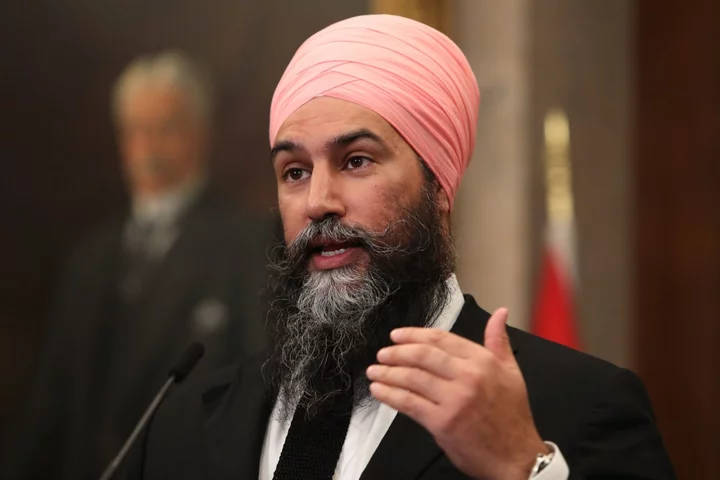Canada’s government should look at taxing excess profits instead of relying on higher interest rates to bring down inflation, according to the head of the left-wing party propping up Prime Minister Justin Trudeau in parliament.
“Many of the causes of inflation have no relevance or connection to interest rates domestically set in Canada or in other countries around the world,” New Democratic Party Leader Jagmeet Singh said Wednesday on Bloomberg Television in New York.
“That approach alone can’t be the right approach when it’s not actually bringing down inflation in a meaningful way, and it’s only putting more burden on people,” Singh said. He added that his party is “looking at an excess profit tax to discourage the gouging that might be occurring, where companies are really using inflation as a cover to bring in higher prices and higher profits.”
The Bank of Canada has turned more attention to firms’ price setting activity as underlying inflation remains sticky. In their most recent decision, policymakers listed “corporate pricing behavior” as one of four items they’d watch in their assessment of the outlook for price pressures, as well as excess demand, wages, and expectations.
Governor Tiff Macklem raised borrowing costs to 4.75% in a surprise move three weeks ago, ending a conditional pledge the bank made in January to pause and assess how more than 400 basis points of tightening in less than a year would impact Canada’s economy. Economists expect another hike in coming months.
Singh’s party has focused its criticism on food inflation and the handful of companies — Loblaw Cos., Empire Co. Ltd. and Metro Inc. — that control the majority of grocery stores in Canada.
In March, Singh made a special appearance at a parliamentary committee to grill the heads of the grocery firms, particularly Loblaw President Galen Weston. He accused the company of making C$1 million ($755,000) a day in excess profits. “How can you look a family in the eyes and tell them that that’s okay?” the NDP leader said at the committee.
“If we didn’t raise retail prices as costs went up, the companies that we operate would disappear almost instantly,” Weston responded.
The New Democrats signed a power-sharing deal with the governing Liberals last year that could run into 2025. The terms of the deal see Singh’s party backing Trudeau’s in key parliamentary votes in exchange for the government advancing certain social policies.
Singh told Bloomberg his party is ensuring that as Trudeau enacts massive clean-tech incentives, labor provisions are inserted that require companies to provide “good wages” as a condition of accessing the subsidies.
He also cited the NDP’s push for universal dental insurance for lower-income Canadians that will eventually see almost nine million people covered. Trudeau has included that C$13 billion program in his government’s March budget.
The prime minister may be open to Singh’s latest suggestion, having imposed a one-time windfall levy on Canada’s major banks and permanently increased their income tax in his government’s 2022 fiscal plan.

